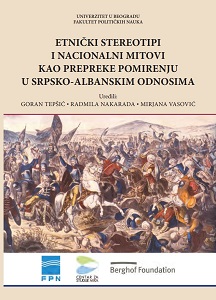
We kindly inform you that, as long as the subject affiliation of our 300.000+ articles is in progress, you might get unsufficient or no results on your third level or second level search. In this case, please broaden your search criteria.


It would be plausible to construct a ‘variety of communisms’ theory, categorizing the state-socialist economies not only by region but by historical epoch. China, for example, imitated the Stalinist model in the first years after the Revolution, but by the 1960s the PRC had developed its own unique social and economic institutions. The goulash communism of János Kádár’s Hungary, which took shape after 1956, differed drastically from the classical Soviet model. Nevertheless, during the last decades of state socialism, the communist societies were broadly on a convergence trajectory: the gap between Czechoslovakia or Hungary and the USSR, for instance, narrowed. State ownership of the means of production, the redistributive nature of economic integration and the political monopoly of the Communist Party created a homologous institutional environment. The system largely suppressed the legacies of pre-communist times.
More...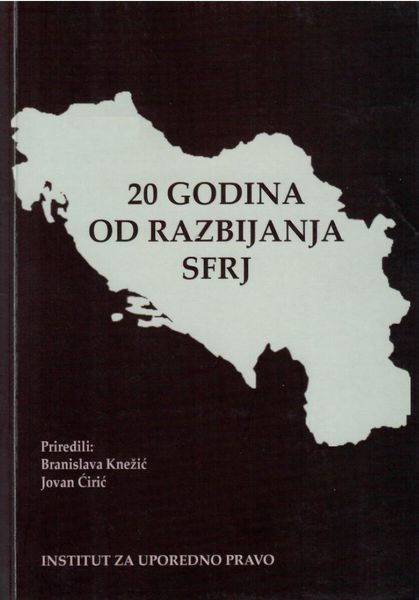
The problem of the relation of the Western World towards Serbs in the past two decades- refering not only to the problems of Kosovo and Metohia and the future of Republic of Srpska, the Hague or EU integrations, but also to the relation at more complex level- is not a result of Serbian idiosyncrasy, which do not match with clearly defined western principles. On the contrary, this problem is an outcome of some sort of the patology of postmodern Western world, that systematically deviates from those principles.
More...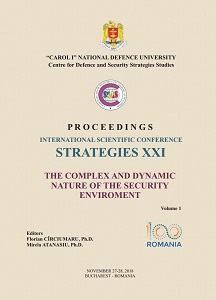
Over the last years, People’s Republic of China (PRC) has surpassed the United States of America (U.S.) as the world’s leading energy consumer and importer of oil.China’s relations with the Middle East become an important issue with global implications.This paper examines China’s interests in and its strategy towards the Middle East and what are the consequences for the U.S.. The aim is to find out to what extend China’s expanding presence in the Middle East poses a threat to the US security partnerships with Arab countries and the US military posture in the region. Even if China influence in the region has largely been economic, growing trade and investment also gives Beijing increased geopolitical stature. To achieve the intended purpose, the research framework will consist on a qualitative analysis based on case study method.
More...
Societal security, as developed by the Copenhagen Security School, is an extremely important area of the broader concept of a contemporary security approach that, in addition to military issues, also addresses a host of other threats from areas such as political,economic, societal or environmental ones. In the study of contemporary social security, a series of concepts specific to the theory of complex systems, such as complexity, self organization,chaos, etc., have been borrowed, which have substantially enriched the hermeneutics of the security discourse on the basis of non-traditional interpretations of social systems. This paper aims to present the basic concepts of complexity and their relevance to the theory and practice of contemporary societal security. At the same time, the paper presents some conclusions regarding the analysis methodology specific to the complexity science applicable to the field of societal security.
More...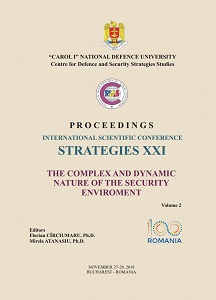
This paper will analyze the causes that led Somalia to become a failed state and the slow pace of recovery discovered by Mogadishu in the recent years. The study is based on qualitative research, analyzing documents which depict the particular history of Somalia and the causes that led to the civil war, as well as quantitative data, when analyzing the number of casualties and refugees that resulted following the unfolding of the Somali conflict. Examining also the rise of the terrorist group Al-Shabaab and the ways in which such organizations manage to replace the role of the state, the paper concludes that the task of rebuilding a failed state is a long and arduous process, in which the international community should adapt its measures to the local specificity of the concerned area. However,as the recent developments show, there is room for hope for the Somali state and people.
More...
The HNS is both a category of logistic support applicable to Article 5 and Non-Article 5 scenarios type and a choice that must be carefully planned and organized to reduce the dependence of NATO missions on their logistical side. Thus, with the accession of local resources, it is obvious that the elimination of time necessary to bring these resources from other places is achieved, which reduces the time necessary for the deployment of troops participating in military activities in Joint Operation Area (JOA) and gives the fighting actions a much greater flexibility. In NATO doctrine, it is considered that the Host Nation Support plays an essential role in gaining decisive advantages over the opponents’ forces.The main purposes of this paper is to present how Host Nation Support (HNS) concept is understood and implemented by NATO member countries, also when our country can provide this type of logistical support, responsibilities assumed in terms of planning and providing HNS and the HNS management system of Romania.
More...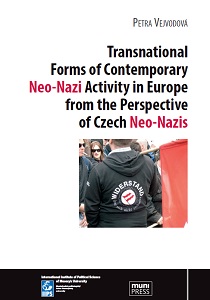
On the most general level, it is evident that transnational activities and structures play a decisive role in our current globalized world. Accordingly, research focused on the transnational level has gained importance in the fields of political science and sociology. The past two decades of social science research have seen a number of publications written in the area. They include Císař 2004; Kolářová 2009; Della Porta, Tarrow 2005; Imig, Tarrow 1999, 2001; Snow, Benford 1999; Tarrow 1998; and Tarrow 2005. It is noteworthy that each of these researchers has chosen to examine transnationalism in the context of social movements.
More...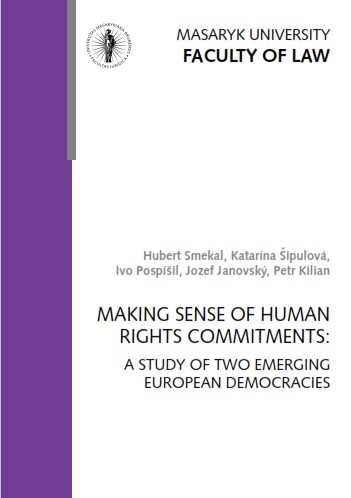
What motivates states to commit to international human rights treaties remains a much-debated question in political and legal science. Many tentative explanations for the observed variation in signature and ratification patterns have been proposed. Some are based on the content of the treaties (the substance of the protected rights and the control mechanism), some focus on the characteristics of the states making a commitment, while others are tied to external factors (having originated either from pressure from the international community or within the domestic political system). Empirical evidence supporting the proposed hypotheses remains nevertheless rather scarce, and overall knowledge about the reasons for signing and ratifying treaties is inconclusive. We aim to contribute to this scholarly discussion by providing a new and thorough examination of the commitment practice in two post-communist countries – the Czech Republic and Slovakia – and in their non-democratic and transitioning predecessors. While both countries have experienced very similar international development propelled by the same international incentives and constraints, their internal political experiences differ significantly.
More...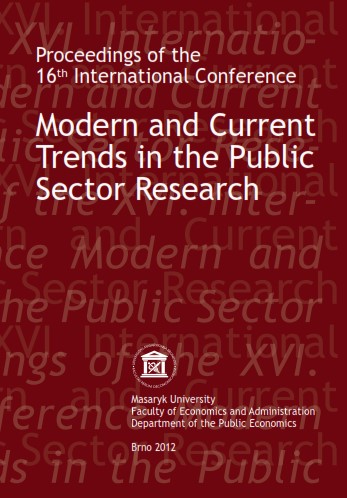
It was my great pleasure to be invited as a keynote speaker, and I am delighted to have been asked to provide a prologue of this highly interesting and topical international event held in Slapanice, organised by the Department of Public Economics at the University of Masaryk, Czech Republic. The event attracted many high qualitys cientific papers from a range of international speakers, including those from established and early career research academics and postgraduate and doctoral students. The level of debate during the day allowed all delegates, but especially students, to clarify conceptual, theoretical and empirical understandings of the subject of public administration and management. It was also very encouraging to see the attendance of many non-academic delegates who work in the field of policy and practice. Their involvement enabled all those present to align research with the practicalities of implementing some of the scientific findings.
More...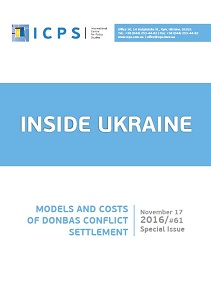
PUBLIC POLICIES: MODELS OF DONBAS CONFLICT SETTLEMENT // ECONOMIC ANALYSIS: COSTS OF DONBAS CONFLICT SETTLEMENT // POLITICAL COMPETITION: POSITIONS OF UKRAINIAN POLITICAL PARTIES REGARDING DONBAS CONFLICT SETTLEMENT
More...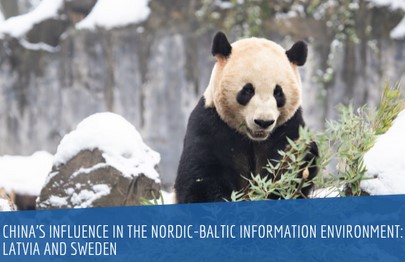
Given its rapid economic growth and expanded geopolitical ambitions, China’s influence projection has grown globally. The World Economic Forum projected that China may overtake the U.S. as the world’s largest economy by 2024. The Belt and Road Initiative (BRI), aimed at optimising and expanding China’s economic cooperation with the Eurasian continent, makes Europe a prime destination for Chinese investment. Countries in Europe have largely treated economic cooperation with China as an opportunity, and the Nordic-Baltic region (NB8) has not been an exception to this trend. However, several European countries have grown apprehensive regarding China’s intents, as economic cooperation has become a backdrop to undesirable political influence via bilateral and multilateral fora. At the same time, buoyed by pride from its rapid economic growth, the Chinese Communist Party (CCP) has become more assertive in defending its national interests, including in the South China Sea region and in response to Western critics of China’s expansionist foreign policy, undemocratic practices and human rights violations. In reaction to these developments, a growing number of European countries have started to look at China’s activities as a challenge or threat to national security. This shift has also become increasingly visible among the countries of the Nordic-Baltic region.
More...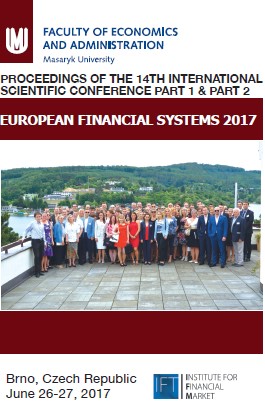
The Proceedings of the International Scientific Conference are aimed at presenting the knowledge of theory and practice in the field of financial systems. Particular emphasis is placed on new conditions, regulatory measures in the financial sector, financial markets, insurance, accounting and tax systems and their impact on the corporate sector. In the field of insurance, among other things the issue of covering emerging insurance risks, their prophylaxis and financing. It also includes financial literacy and its impact on finance.
More...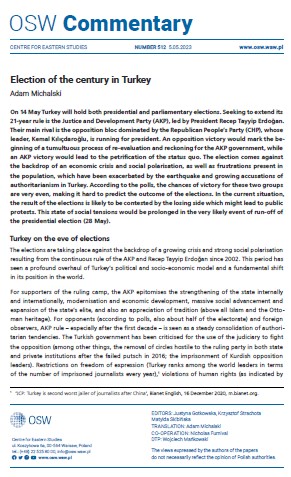
On 14 May Turkey will hold both presidential and parliamentary elections. Seeking to extend its21-year rule is the Justice and Development Party (AKP), led by President Recep Tayyip Erdoğan. Their main rival is the opposition bloc dominated by the Republican People’s Party (CHP), whose leader, Kemal Kılıçdaroğlu, is running for president. An opposition victory would mark the beginning of a tumultuous process of re-evaluation and reckoning for the AKP government, while an AKP victory would lead to the petrification of the status quo. The election comes against the backdrop of an economic crisis and social polarisation, as well as frustrations present in the population, which have been exacerbated by the earthquake and growing accusations of authoritarianism in Turkey. According to the polls, the chances of victory for these two groups are very even, making it hard to predict the outcome of the elections. In the current situation, the result of the elections is likely to be contested by the losing side which might lead to public protests. This state of social tensions would be prolonged in the very likely event of run-off of the presidential election (28 May).
More...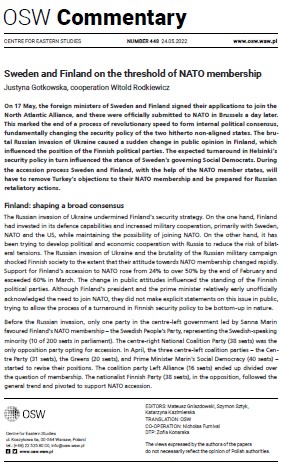
On 17 May, the foreign ministers of Sweden and Finland signed their applications to join the North Atlantic Alliance, and these were officially submitted to NATO in Brussels a day later. This marked the end of a process of revolutionary speed to form internal political consensus, fundamentally changing the security policy of the two hitherto non-aligned states. The brutal Russian invasion of Ukraine caused a sudden change in public opinion in Finland, which influenced the position of the Finnish political parties. The expected turnaround in Helsinki’s security policy in turn influenced the stance of Sweden’s governing Social Democrats. During the accession process Sweden and Finland, with the help of the NATO member states, will have to remove Turkey’s objections to their NATO membership and be prepared for Russian retaliatory actions.
More...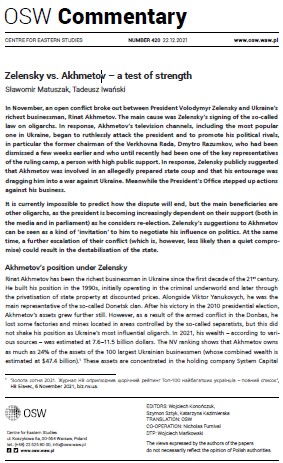
In November, an open conflict broke out between President Volodymyr Zelensky and Ukraine’s richest businessman, Rinat Akhmetov. The main cause was Zelensky’s signing of the so-called law on oligarchs. In response, Akhmetov’s television channels, including the most popular one in Ukraine, began to ruthlessly attack the president and to promote his political rivals, in particular the former chairman of the Verkhovna Rada, Dmytro Razumkov, who had been dismissed a few weeks earlier and who until recently had been one of the key representatives of the ruling camp, a person with high public support. In response, Zelensky publicly suggested that Akhmetov was involved in an allegedly prepared state coup and that his entourage was dragging him into a war against Ukraine. Meanwhile, the President’s Office stepped up actions against his business.
More...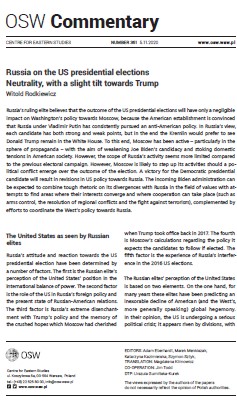
Russia’s ruling elite believes that the outcome of the US presidential elections will have only a negligible impact on Washington’s policy towards Moscow, because the American establishment is convinced that Russia under Vladimir Putin has consistently pursued an anti-American policy. In Russia’s view, each candidate has both strong and weak points, but in the end the Kremlin would prefer to see Donald Trump remain in the White House. To this end, Moscow has been active – particularly in the sphere of propaganda – with the aim of weakening Joe Biden’s candidacy and stoking domestic tensions in American society. However, the scope of Russia’s activity seems more limited compared to the previous electoral campaign. However, Moscow is likely to step up its activities should a political conflict emerge over the outcome of the election. A victory for the Democratic presidential candidate will result in revisions in US policy towards Russia. The incoming Biden administration can be expected to combine tough rhetoric on its divergences with Russia in the field of values with attempts to find areas where their interests converge and where cooperation can take place (such as arms control, the resolution of regional conflicts and the fight against terrorism), complemented by efforts to coordinate the West’s policy towards Russia.
More...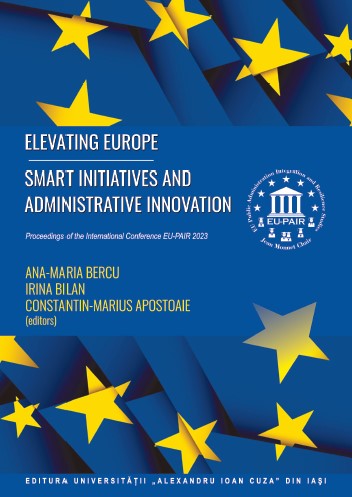
Dear Esteemed Readers, We are thrilled to present to you the latest volume Elevating Europe: Smart Initiatives and Administrative Innovation. Proceedings of the International Conference EU-PAIR 2023 which is the result of the 2023 EU-PAIR Annual International Conference – 2nd Edition Challenges and Dynamics of European Administrative Area held in Iasi, Romania, during 22nd and 23rd of June 2023, part of Jean Monnet Chair. EU Public Administration Integration and Resilience Studies, acronym EU-PAIR, project no. ERASMUS-JMO-2021-HAI-TCH-RSCH- 101047526. This collection of insights and analyses delves into the intricate tapestry of the European Administrative Area, weaving together the threads of public and private affairs to foster sustainable economic growth, business resilience, and administrative innovation. In the pages that follow, you will encounter a diverse array of contributions from esteemed scholars, policymakers, and professional experts, all converging to illuminate the multifaceted landscape of European administration. Our aim is not only to showcase the current state of affairs but to provide a roadmap for the future—a future where innovative administrative practices play a pivotal role in shaping the destiny of Europe.
More...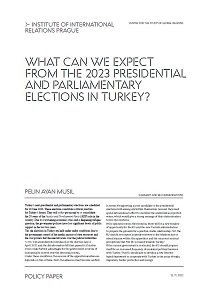
Turkey’s next presidential and parliamentary elections are scheduled for 18 June 2023. These elections constitute a critical juncture for Turkey’s future. They will either put an end to or consolidate the 20 years of the Justice and Development Party (AKP) rule in the country. Due to a worsening economic crisis and a deepening refugee question, the government policies have lost significant levels of public support in the last two years. Yet, the elections in Turkey are held under unfair conditions due to the government control of the media, misuse of state resources and the vast powers that the executive has over the judicial authorities. The amendments introduced in the election law in April 2022 and the disinformation bill that passed in October 2022 create further advantages for the government in terms of increasing its control over the electoral process. Under these conditions, the success of the oppositional alliances depends on two criteria. First, the alliances must become unified in terms of supporting a joint candidate in the presidential elections both among and within themselves. Second, they must spend extraordinary effort to mobilize the undecided and protest voters, which would give a strong message of their determination to win the elections. If the opposition wins the elections, there will be a new window of opportunity for the EU and the new Turkish administration to prepare the grounds for a positive, stable relationship. Yet, the EU should not expect a speedy recovery in the relations due to mixed stances within the opposition and the recurrent societal perceptions that ‘the EU is biased towards Turkey. ’If the current government is re-elected, the EU should prepare itself for an increased frequency of escalated political tensions with Turkey. The EU should aim to develop a new interest-based framework to cooperate with Turkey in the areas of trade, migration, border protection and energy.
More...
The issue of migration in Serbia has been approached fatalistically in the last few years, by often presenting information that is not completely accurate in order to create the image that especially the most talented are leaving Serbia. The reality is different: the educational structure of people leaving the country is similar to the level of education of the resident population (Arandarenko, 2022). Nevertheless, the pressure coming from the public was transferred to the decision-makers, which motivated the adoption of the first migration strategy in 2019, which focused almost entirely on ways to prevent population outflow. A little later adopted Economic Migration Strategy of the Republic of Serbia for the period 2021-2027 softened the tone of the first version of the document, but the measures adopted due to concerns about the so-called “brain drain” phenomenon sought to encourage the return of highly educated individuals to Serbia.
More...